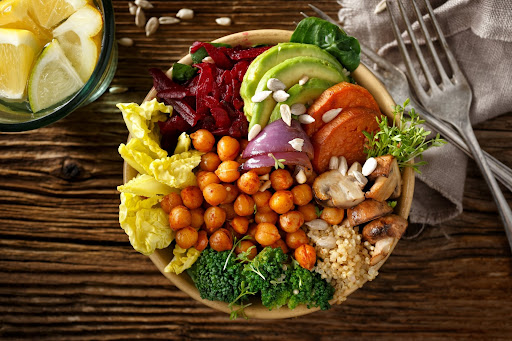In recent years, there has been a growing interest in plant-based diets, and for good reason. Plant-based eating offers a multitude of health benefits, ranging from improved heart health to weight management and beyond. In this article, we’ll delve into the remarkable advantages of adopting a plant-based diet and why it’s worth considering for your overall well-being.
1. Understanding Plant-Based Diets: What Are They?
Plant-based diets focus on consuming foods derived from plants, such as fruits, vegetables, grains, nuts, seeds, and legumes, while minimizing or excluding animal products like meat, dairy, and eggs. This dietary approach emphasizes whole, unprocessed foods that are rich in nutrients and fiber.
2. Health Benefits of a Plant-Based Diet
a. Heart Health: Plant-based diets have been shown to lower the risk of heart disease by reducing cholesterol levels, blood pressure, and inflammation. The high fiber content of plant foods also promotes heart health by improving cholesterol levels and supporting healthy blood sugar levels.
b. Weight Management: Plant-based diets are naturally lower in calories and saturated fat compared to omnivorous diets, making them conducive to weight management and weight loss. Additionally, the abundance of fiber in plant foods helps promote feelings of fullness and satiety, reducing overall calorie intake.
c. Improved Digestion: The fiber-rich nature of plant-based foods supports healthy digestion by promoting regular bowel movements and maintaining a healthy gut microbiome. This can help prevent constipation, bloating, and other digestive issues.
d. Reduced Risk of Chronic Diseases: Numerous studies have linked plant-based diets to a lower risk of chronic diseases, including type 2 diabetes, certain types of cancer, and autoimmune conditions. The antioxidant and anti-inflammatory properties of plant foods play a key role in reducing disease risk and promoting overall health.
3. Environmental Benefits of Plant-Based Eating
In addition to the health benefits, plant-based diets also have a positive impact on the environment. Plant agriculture generally requires fewer natural resources, such as water and land, and produces fewer greenhouse gas emissions compared to animal agriculture. By choosing plant-based foods, individuals can reduce their carbon footprint and contribute to environmental sustainability.
4. Tips for Adopting a Plant-Based Diet
a. Start Slow: Transitioning to a plant-based diet doesn’t have to happen overnight. Start by incorporating more plant foods into your meals and gradually reducing your intake of animal products.
b. Experiment with New Foods: Explore the wide variety of plant-based foods available, from exotic fruits and vegetables to ancient grains and plant-based meat alternatives. Get creative in the kitchen and try out new recipes to keep things interesting.
c. Focus on Nutrient Density: Ensure that your plant-based meals are nutritionally balanced by including a variety of whole foods rich in essential nutrients such as protein, iron, calcium, and vitamin B12. Incorporate sources of these nutrients, such as beans, lentils, tofu, leafy greens, nuts, and fortified foods, into your diet.
d. Stay Informed: Educate yourself about plant-based nutrition to ensure you’re meeting your nutritional needs and getting all the essential nutrients your body requires. Consider consulting with a registered dietitian or nutritionist for personalized guidance and support.
5. FAQs (Frequently Asked Questions):
Q1: Can I get enough protein on a plant-based diet? A1: Yes, you can! Plant-based sources of protein include beans, lentils, tofu, tempeh, edamame, nuts, seeds, and whole grains. By including a variety of these foods in your diet, you can easily meet your protein needs.
Q2: Will I miss out on essential nutrients by avoiding animal products? A2: With proper planning, you can obtain all the essential nutrients your body needs from a plant-based diet. Be sure to include a variety of whole foods and consider supplementing with vitamin B12, which is primarily found in animal products.
Q3: Is a plant-based diet suitable for children and pregnant women? A3: Yes, plant-based diets can be suitable for individuals of all ages and life stages, including children and pregnant women. However, it’s essential to pay attention to nutrient intake and ensure adequate consumption of key nutrients like protein, iron, calcium, and vitamin B12.
Q4: Can I still enjoy my favorite foods on a plant-based diet? A4: Absolutely! There are countless plant-based versions of popular dishes available, from veggie burgers and vegan pizzas to dairy-free ice cream and plant-based cheese. With a bit of creativity, you can enjoy all your favorite foods while following a plant-based lifestyle.
Q5: Will a plant-based diet help me lose weight? A5: Plant-based diets are naturally lower in calories and saturated fat compared to omnivorous diets, making them conducive to weight loss. Additionally, the high fiber content of plant foods promotes feelings of fullness and satiety, which can aid in weight management.

